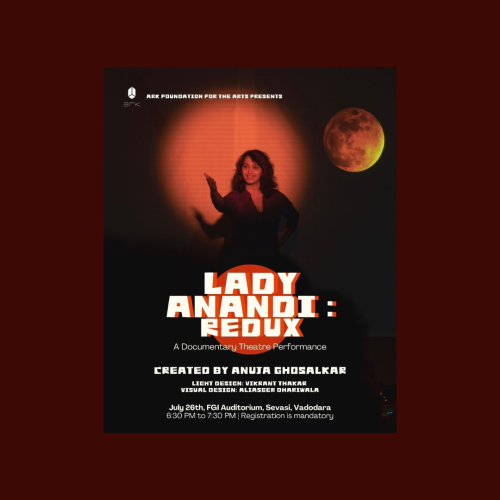
On the rainy evening of 26 July 2024, Anuja Ghosalkar, a Bangalore-based theatre performance artist and founder of Drama Queen Company, delivered an unsettling yet amusing one-woman show over the course of an hour at the FGI auditorium in Sevasi, Vadodara, hosted and organized by the Ark Foundation of Arts, Vadodara.
Anuja performed one of her renowned performances titled ‘Lady Anandi: Redux’, which is a reiteration of ‘Lady Anandi’ and emerged out of her interests and quests for archiving, research, and documentary films. The drama ‘Lady Anandi’ takes its roots from the artist’s family history and her research on her great grandfather, who played a female impersonator in Marathi theatre, which was scripted and developed during her month-long residency at Art Lab Gnesta, Sweden.
Drama explored the transgressions of conventional theater. It challenges and expands the boundaries of traditional theatre practices. In the drama, Anuja is possessed by her great-grandfather and narrates his story, giving references to the 19th-century Marathi theatre tradition when men performed roles of women by impersonating them and the challenges they grappled with performing the other gender. Her drama is a blend of history and fiction, as she used historical facts along with imagination and creative faculty in the process.
As the performance goes on, it highlights the aspects of gender fluidity and the personal as well as shared history of the characters. The idea delved into gender stereotypes, questioning the societal roles assigned to each of us. Another key aspect of the act is the query, “Am I woman enough?” which shines a light on the notion of identity and the expected social behavior and norms that push the boundaries of conventional gender roles. For instance, one of the acts showed her embracing herself with jewelry and makeup when she was in the role of Lady Anandi; in another, she used a fake big mustache as satire to address the ideas of masculinity and femininity along with gender performativity.
She weaved classical Shakespearean and Marathi theatre traditions. In a powerful scene from the act, she is persecuted and feels suffocated in her own body; she begins to tap her hands repeatedly, creating a strong reverberating sound from her actions, a reference that comes from Macbeth.
In addition, Anuja used the freedom of being an artist; she edited and omitted the script in front of the audience. The sharp cuts and edits in a continuous performance sparked curiosity and tension between the character and the audience. Liberty, in the use of spaces beyond the stage, welcomes the viewers as a part of the drama and completes the circle. Minimal and indirect use of props, including personal archival materials, heightened interest and engagement with the play.
At the end, Anuja opened the stage for Q&A, allowing the audience to interact with her as Anuja Ghosalkar, the artist, rather than the art that was Lady Anandi.
Written by- Astha Dubey & Saloni Bhojani